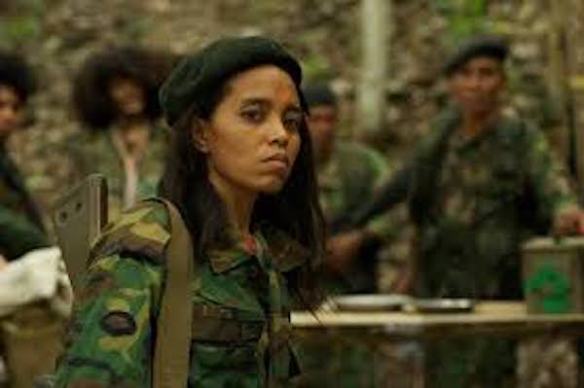The Second Luso World Cinema Blogathon
Welcome to the Second Luso World Cinema Blogathon! hosted by Le’s Critica Retro and Beth Ann’s Spellbound by Movies
 Following the Carnation Revolution of 1974 and eventual democratic reforms, Portugal began a period of decolonization. On the 28th of November 1975, East Timor became independent after 400 years of colonial rule. Unfortunately, the island nation’s freedom was short-lived, Their next-door-neighbor Indonesia invaded nine days later, beginning a reign of terror and the deaths of hundreds of thousands. The genocide wasn’t reported widely by the U.S. news media. Now that America is beset by an attempted insurrection and chaos, this may be an opportune time to look to East Timor’s tragic history [Now the Democratic Republic of Timor-Leste].
Following the Carnation Revolution of 1974 and eventual democratic reforms, Portugal began a period of decolonization. On the 28th of November 1975, East Timor became independent after 400 years of colonial rule. Unfortunately, the island nation’s freedom was short-lived, Their next-door-neighbor Indonesia invaded nine days later, beginning a reign of terror and the deaths of hundreds of thousands. The genocide wasn’t reported widely by the U.S. news media. Now that America is beset by an attempted insurrection and chaos, this may be an opportune time to look to East Timor’s tragic history [Now the Democratic Republic of Timor-Leste].
Directed by Luigi Acquisto and Bety ReisIn, A Guerra da Beatriz (Beatriz’s War, 2013) is the first narrative film from Timor-Leste. The Indonesian invasion and subsequent war of liberation is told through the framework of the French film The Return of Martin Guerre (1982). In director Daniel Vigne’s original, Gérard Depardieu’s title character is a returning soldier in medieval times who may or may not be who he says he is.
In A Guerra da Beatriz, Timorese children Beatriz (Doretea Soares) and Tomas (Eugenio Soares) are married to secure an alliance between their respective clans. There’s haggling over the dowry animal exchange that’s resolved so the marriage ceremony goes ahead.
Tomas is a sensitive boy who suffers when his pet rooster is entered in a cock fight. He’s comforted by a sympathetic priest, Father Nicolau (Osme Gonçalves) In adolescence, Tomas prefers working with the women of the village. The marriage with Beatriz remains seemingly chaste.
Life is tranquil until Indonesia invades. The villagers flee en masse to the mountains where the Resistance has taken refuge. There’s a cease fire with the Indonesians, a subsequent betrayal and a massacre where Tomas is taken and thought dead. To save the rest of her family, Tomas’s sister Teresa (Augusta Soares) is blackmailed into a sham marriage with the villanous Indonesian commader, Captain Sumitro (Gaspar Sarmento).
Mirroring Martin Guerre, a handsome young man returns to the village years later claiming to be Tomas. He resembles him and calls everyone by name. However, his personality has changed dramatically. Teresa believes him, justifying his transformation as a consequence of war but Beatriz (Irim Tolentino) is skeptical. She’s attacted to the new Tomas and hopes his story is true.
With a cast of theatre actors and non-professionals, the fable-like Beatriz has a feeling of authenticity and realism. It’s even more remarkable because it was partially filmed in the mountains of Timor-Leste where there was no electricity. Director of photography Valeriu Campan deservedly won the 2013 award for Best Cinematography from the Australian Cinematographers Society. For more on the film and to order a dvd or soundtrack cd, contact: https://www.aguerradabeatriz.com
Directed by Robert Connolly, Balibo (The Balibo Conspiracy, 2009) tells the true story of the search for five Australian journalists who disappeared in East Timor in 1975 just before the Indonesian invasion. 
The film begins with the testimony of a woman named Juliana Da Costa (Bea Viegas) who as a child was witness to the atrocities committed by the Indonesian military. In flashback, she revisits the events.
In 1975, Roger East (Anthony LaPaglia), an unsentimental, world-weary journalist, teams up with East Timorese Secretary of Foreign Affairs José Ramos-Horta, played by Oscar Isaac (Star Wars) in an early role.
Ramos-Horta, who would later share a Nobel Peace Prize and help lead his country, travels to Australia to convince Roger to return with him to tell East Timor’s story to the world. Roger has a history of covering important issues but claims to be content picking up a pay check at his current job where he no longer has to risk his neck. The younger man asks what happened to his passion and Roger doesn’t have a good answer.
 The film then cuts back and forth between the five disappeared Australian journalists and Roger’s search for them that begins in Dili, East Timor. There, he encounters Juliana as child (Anamaria Barreto) who works in her father’s hotel. The journalists stayed there three weeks before and the hotelier thinks they were headed to Balibo.
The film then cuts back and forth between the five disappeared Australian journalists and Roger’s search for them that begins in Dili, East Timor. There, he encounters Juliana as child (Anamaria Barreto) who works in her father’s hotel. The journalists stayed there three weeks before and the hotelier thinks they were headed to Balibo.
Based on Cover-Up: The Inside Story of the Balibo Five by Jill Jolliffe, it’s a harrowing film reminiscent of Peter Weir’s In the Year of Living Dangerously (1982). Cinematography is by Tristan Milani. Editing by Nick Meyers. The supporting cast is drawn from the Timorese community including some of the actors from Beatriz’s War. Available on Amazon Prime.





